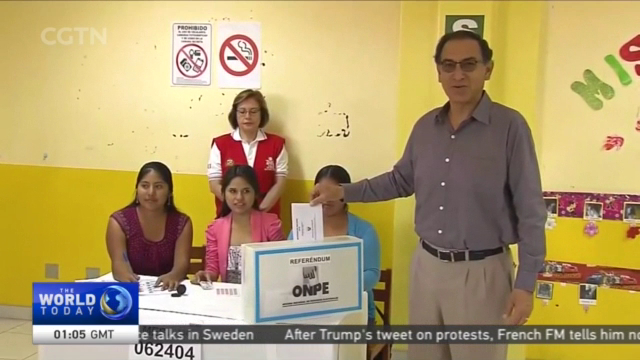
10:20, 10-Dec-2018
Peru Referendum: Voters consider new law to further empower presidents
Updated
09:55, 13-Dec-2018
03:10

Meanwhile, in South America, another vote was underway. Peruvians went to the polls Sunday in a referendum that could empower President Martin Vizcarra to overhaul the country's judiciary and political institutions, in the wake of corruption scandals that have rocked the country. CGTN's Dan Collyns reports from Lima.
Peruvians are voting with hope. This referendum comes at the end of a year of seismic shifts in politics - changes which many Peruvians welcome. They are being asked if they want to change the system used to appoint judges and prosecutors to toughen laws on electoral campaign financing - adding criminal penalties and to limit lawmakers' terms by banning immediate re-election.
Polls show most people say an overwhelming 'yes' to these measures. But a fourth and final question - to change Peru's one-chamber legislature to a bicameral system -- was predicted to be voted down a sign of just how unpopular politicians are right now.
DAN COLLYNS LIMA "This poll is about more than the four questions on the voting card. For many Peruvians, it's a vote of confidence for their president Martin Vizcarra who has met public indignation over corrupt judges and politicians with a pledge to root out graft from the top down."
Turnout is high in Peru, where voting is mandatory, and those who stay home face fines.
CAMILA BATANERO VOTER "This vote is very important because of the Congress issue; it will mean the non re-election of lawmakers who have caused so much trouble for the country."
LUIS MORALES VOTER "This is kind of a plebiscite for the president and if the 'yes' vote is overwhelming the president will feel supported."
Martin Vizcarra, then-vice president to Pedro Pablo Kuczynski, took office when the leader resigned amid corruption allegations in March. In the wake of a string of scandals, Vizcarra focused on the fight against corruption, as he told CGTN in October:
MARTIN VIZCARRA PERUVIAN PRESIDENT "If this government is remembered it will be for fighting against corruption, in theory and in practice, and I stress in practice - because in theory everyone has said they will fight against corruption."
Four former Peruvian presidents are under investigation for ties to the scandal-plagued Brazilian construction firm Odebrecht, which has admitted to handing out 30 million dollars in bribes in Peru.
In October, opposition leader Keiko Fujimori was taken into preventative detention as prosecutors investigate her party's financial ties with the company. While on Monday, Uruguay turned down an asylum request by two-time former president Alan Garcia, who claimed 'political persecution' after he was barred from leaving the country. Prosecutors are investigating allegations he took bribes from Odebrecht in his second term, from 2006 to 2011. Dan Collyns, CGTN, Lima.

SITEMAP
Copyright © 2018 CGTN. Beijing ICP prepared NO.16065310-3
Copyright © 2018 CGTN. Beijing ICP prepared NO.16065310-3